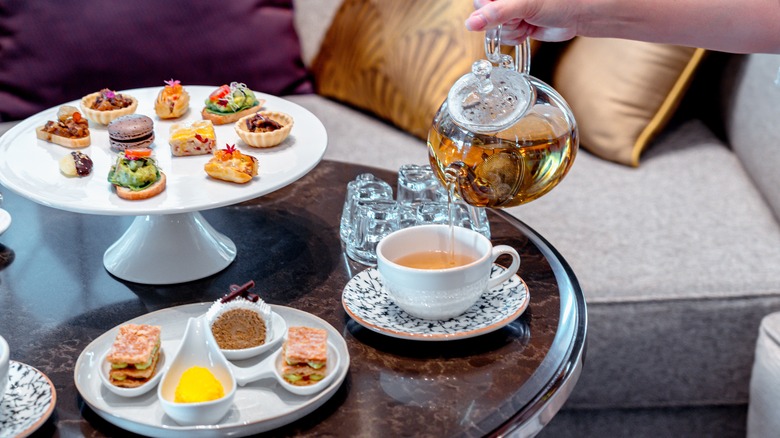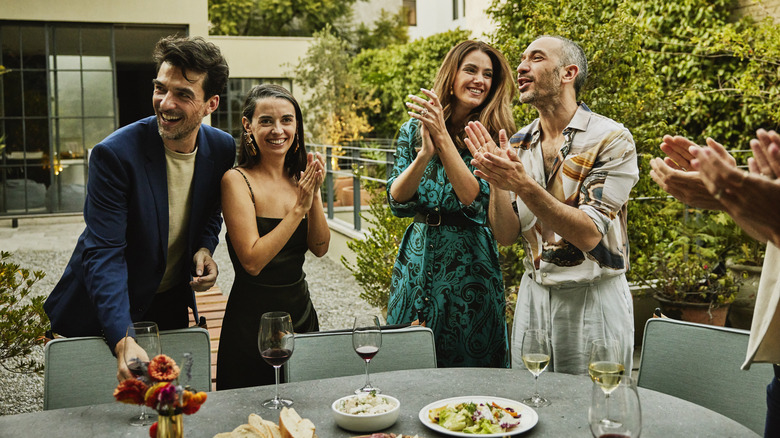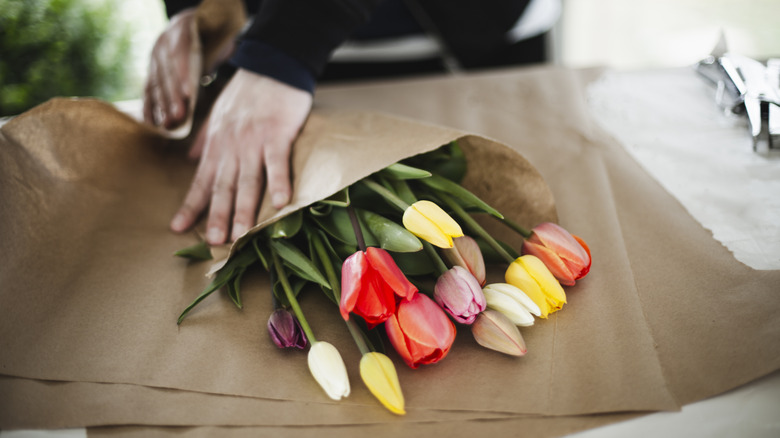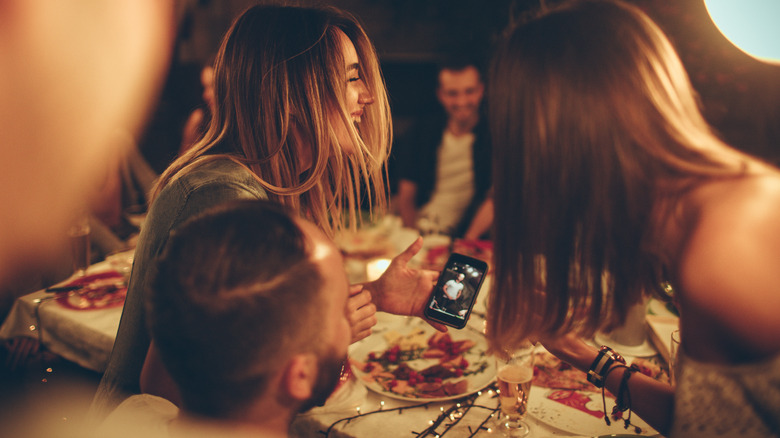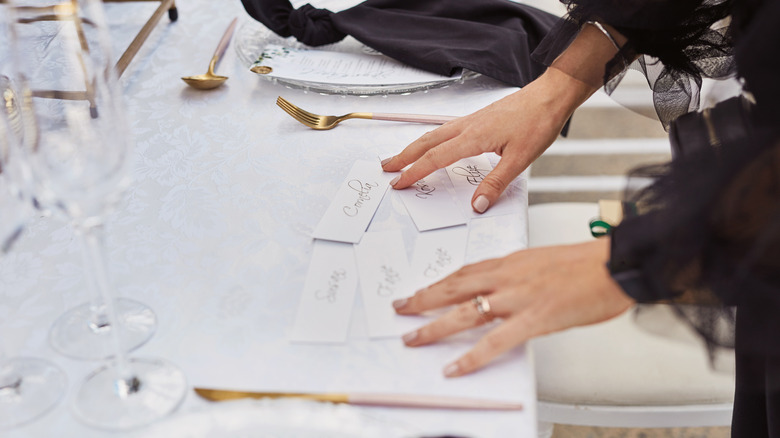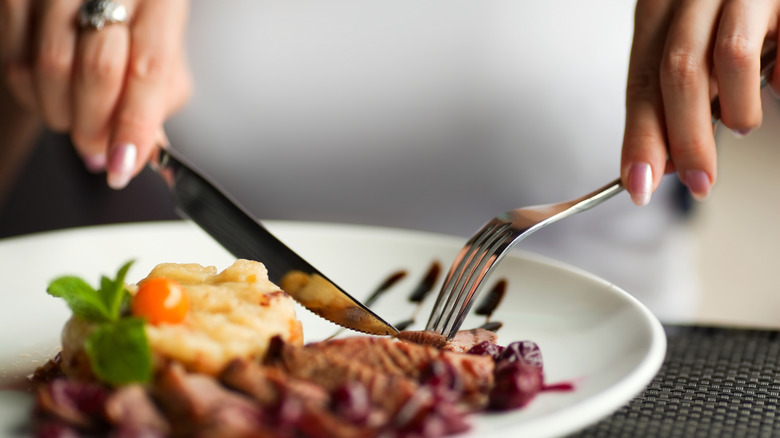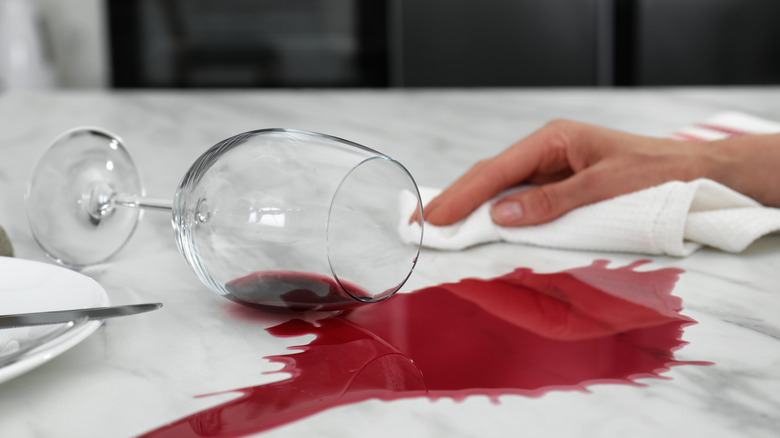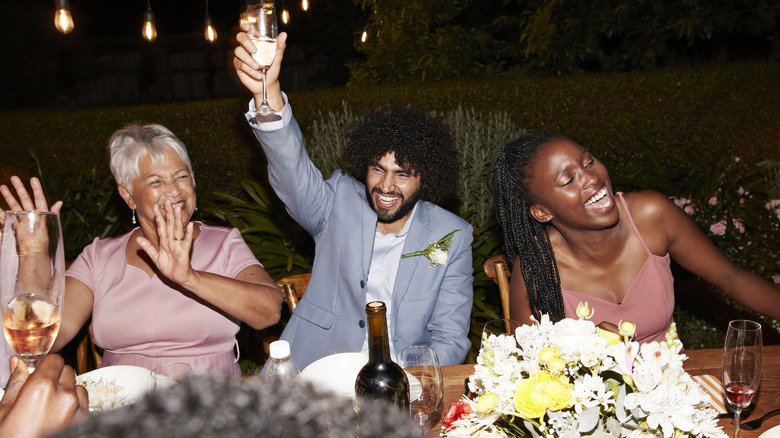England Is Full Of Unique Dining Etiquette Rules You Have To Follow
We may receive a commission on purchases made from links.
Just the mention of English dining etiquette might evoke the notion of dramatically extended pinkies, clinking tea service spoons, and softly muttered "pardon's" while nibbling jammy crumpets and clotted cream. But while Brits seem to be born with effortless good manners, these simple tips and tricks are also built for the rest of us feasting in the modern dining era.
We're all at least a little familiar with not putting our elbows on the table, using the tinier forks for salad, and something about not slurping soup directly from the bowl. But even though we've gone all in on cell phones at the table, schedules packed beyond the hours of the day, and casual Fridays every day of the week, this is your cordial invitation to share the timeless gift of social grace with your friends.
While there's always room for sweatpants and pizza at home in front of the T.V., there's nothing wrong with treating others with some British grace and respect. From the RSVP to the most courteous conversation, please and thank you for accepting the hot kettle of tea we are about to dish at your pleasure.
It's good manners to RSVP ASAP
Technically RSVP means "répondez s'il vous plaît," the true meaning of which politely suggests that you, y'know, respond if you like. That might sound like an easy breezy request that no one really cares about (yep, that email invite just got archived to a mailbox we'll never find), but in reality, your RSVP needs to be returned to its sender as soon as possible.
For the record, it's totally okay if you can't make the birthday/anniversary/premiere/graduation/vacation/thing. Everyone understands that all of their guests have lives as well as a zillion other things to schedule. But no party planner wants to be left hanging, wondering how many canapés to put out for all the guests who didn't reply (are we doing the punch bowl cocktail? Will anyone show up in time for cake?). If it's a formal occasion — say, a wedding, or other well-orchestrated event — respond before the given deadline and don't change your mind. Unless you are befallen with the world's most consequential reason for not showing up to something you said you'd attend, it's be there, or be (rudely) square.
Follow even the slightest hint of a dress code
We've graduated from club rules restricting baseball caps, team jerseys, and flip flops. Take a cue from the invite or your fellow dining guest to dress the part like an affable pro (or someone who at least read beyond "You're invited to").
If there's a theme? Lean into it with all the gusto and same-day Amazon Prime-ing the moment might require. See a note about a formal dress code? Shine up those shoes and powder your nose. While it's no longer commonplace for men to wear suit jackets to dinner on the town, if you notice your date gussied up with a nice outfit, style yourself accordingly. Of course, just because you're dressing up doesn't mean it's open season on dinner and a show. The custom, in British culture, is for more modest dressing to respectfully signal a sense of occasion. That might mean different things to different people, but whether you go long on the sleeves, a little less contoured along your curves, or you fasten just a button higher, the key is to make the food and the company the stars of the show — and leave everyone wanting more.
There's no such thing as fashionably late
While there are surely cultural trends toward "flexible punctuality," not everyone celebrates the art of fashionable lateness for dinner. And that goes double for your host who's just trying to get the food on the table while it's hot — never mind the rest of your party left waiting at the restaurant until everyone has arrived (traffic, right?).
When it comes to the perfect dinner party, timing is everything. As for how the Brits might see it, showing up on time means arriving at the stated start time, and for up to 10 to 15 minutes after that. Anything further, and you're officially late. If you happen to be running behind for any reason, let your host know as soon as possible with a text or quick call — and be honest about the adjusted timeframe your ETA. Are you really five minutes away? Or are you still taking a shower? This allows dinner to begin without you (or not).
But just like it's rude to show up late without a heads-up, it's also gauche to arrive too early. There's lots to do before a dinner party, and your hosts need all the time they've allotted. If your trip went faster than expected, just wait in your car (or a nearby bar) until it's time for the festivities to begin.
A polite greeting starts with a handshake not a hug
In the U.S., many people — widely known as "I'm a hugger" or "Bring it in" types — prefer greeting new people with a warm hug that might involve a pat on the back. But British etiquette clearly suggests that the most polite way to greet someone you don't know is with a handshake.
This might feel a bit formal at first — especially for those of us used to greeting with a kiss — but for anyone feeling that personal space energy, an English handshake saves the day. You'll maintain a distance of 1 meter apart (that's 40 inches for Americans), but you don't need to bust out the measuring tape. Just kind of eye-check the space between the two opposite elbows as your hands meet, and don't crunch in on that courteous bubble. Keep your hand appropriately firm (no floppy fish fingers), palm to palm (you're not the queen), and release your grasp before it seems like you're asking this new person to go to prom.
Never gift your dinner party host fresh flowers
Before anyone interprets this as "Cool! I gift you with my presence," you should absolutely bring a real gift to a dinner party that isn't just yourself. It can even be flowers. But there's a way to do this that doesn't require any extra effort from the person doing all the cooking.
It's respectfully English to offer the host a token that they don't have to tend to the second you walk through the door. Maybe that's a party-pleasing batch of Ina Garten's salted caramel nuts, or a bottle of Ina's homemade vanilla (we hear there are non-Ina options, but we're not sure what those are). What it definitely isn't is a bunch of lilies that immediately need to be trimmed, watered, and arranged in a vase. Ditto on that gift bottle of wine that you wrongly assumed you'd be drinking tout suit. Still, if you're set on fresh flowers, you have options. Bring a bouquet that comes in a vase of water, or have an arrangement delivered a day ahead of the party (or even the day after as a thank you) so your host has plenty of time to literally smell the roses.
But first, cocktails (or water, or tea, or soda)
According to British law (only kidding, it's just a strong suggestion that could involve a refreshing negroni cocktail), it's good manners for the party host to offer guests a drink the very minute they step into your home. Any later than that would be uncivilized.
While there's no way to know if a party-goer missed the train and was then forced to shlep the 40 blocks to your apartment, thirsting for sustenance, this isn't about that. It's merely the appropriate way to show your guests that you've considered their every need, start to finish. This is also a thing in the U.S., but in England, it happens immediately — and never because the guest was so parched they were forced to ask. Luckily, you don't have to show up to the door with bottle service and sparklers. Simply asking if your guest would like a glass of water — or tea, a beer, coffee, or a soda — does wonders for making everyone feel at home.
Ditch the phone when you're with company
Ever since the advent of the original iPhone in 2007, we've engaged in a battle that can only be described as reality versus scrolling. But while we'd probably never leave the house without our phones, when we're with company — at least according to English etiquette — the smart move is keeping your smartphone out of sight.
Yes, all of your Instagram followers will be left in the dark about what you had for dinner because you didn't document each course. But you'll gain peace of mind knowing that you didn't miss out on spending time with the person right in front of you. On the occasion that an important call or message may truly need attention — for real — keep notifications on silent or vibrate, and just make sure you leave the table to answer it.
Manifest the magic of seating design
Don't just plop down next to your partner or your best friend at a dinner party and settle in for a night of inside jokes. While more formal events like weddings or galas often feature place cards that show you where to park it, even casual dinner parties can benefit from the English custom of designated seating.
Traditionally, the host sits at the end of the table, while that person's partner sits at the other end. Of course, some hosts like to sit opposite each other in the middle, with guests fanning out around them. And it's totally allowed for anyone tending to the food to sit closest to the kitchen. While much of this strategy relies on traditional gender roles — with the suggestion that seating should alternate between men and women — the modern takeaway for any group of people is that those who already know each other IRL shouldn't be seated next to each other for dinner, so as to spark the most effervescent tête-à-tête. Wanna go all in? Place cards signal to guests that you've thoughtfully designed an enlightened meeting of the minds. Or, at least you corralled the fun uncle with the shy work friend to really get the conversation flowing.
Enjoy the food that you're served
We've all played the part of the discerning diner, the choosy connoisseur, or the finicky foodie. But exactly no one appreciates that guy showing up to ruin a dinner party in someone's home. Once you've RSVP'd and arrived at the event, it's simply good English manners to show your gratitude by enjoying everything on your plate.
Of course this does not apply to severe allergies, intolerances, or anyone just not eating carbs this month. But if you are following a special diet of any kind, you should always share that information with your host several days before the event, so there's time to make adjustments to the meal, or otherwise prepare (maybe save the personalized cocktail business cards for your local bar, not your dear friend's house who spent all day cooking). But once you're seated at the table, it's just polite to act like you're truly tasting the best meal of your life.
Master your domain with your utensils
Moving beyond the jaw-dropping amount of serve ware in a formal place setting, there are English rules to abide by once you've picked up the correct knife and fork. Also, just FYI: That little dish isn't full of ice cream, it's butter.
First, unlike the U.S. where it's normal to cut your steak and then swap utensils into the opposite hands to eat it, Brits consider it proper to keep your knife and fork in the same hands — to avoid clattering around. This means you might eat with your fork in your left hand, even if you're right-handed. And while you're at it, only cut a single bite at a time. This is mostly because you are, indeed, over the age of three and likely more than capable of eating a meal that isn't bite-sized. Unless you're eating pizza or fried chicken at a barbecue, almost everything (except dinner rolls) must be cut with a knife and fork. Never shovel peas (prick them gently with the fork tines), scoop up your soup by tilting the bowl and spoon away from you, and butter your bread one bite at a time (no schmearing).
When you're finished, it's well-mannered to leave your utensils in a "that about wraps it up" position. For Brits, that means the fork and knife are placed at roughly 6:30 on the clock. After that, you can shift your focus onto the teeny little cake fork you've been wondering about all night.
Brush up on your casual conversation
Like a beach ball bouncing along the fingertips of concertgoers, the English are experts at volleying light and casual dinner conversation. This is, in fact, the social range in which you should select your topics — even if you're dying to ask Martha why she didn't bring James like usual, and instead is holding hands with Karen. It's all about avoiding probing questions, offering no offensive opinions, and dodging hot topics that might otherwise hamper the good vibes. Save it for later, and instead talk about the lovely weather we're having this time of year.
And while we're here, minding the p's and q's, feel free to throw around polite thank you's, please's, and sorry's like confetti at a parade. For the record, the phrase isn't "Can I have another extra dirty martini?" it's "May I have another extra dirty martini?" And yes, you may. Also, like, make sure you don't use "like" all the time because it, like, makes you appear, like, less serious as a person. Of course, it also makes you seem younger, since it's a trend with the youth. So, even though it's bad manners, do with that one, like, what you will.
Wrangle the broccoli from your teeth in private
If you enjoyed the heck out of your chicken and broccoli linguini, you already won this dinner party. But now you might be fading out of the table-side convo, wondering how many bright green florets are currently lodged between your pearly whites. Still, this isn't the time to bust out a mirror, a toothpick, your fork, or even a strategic swish of seltzer to free the food.
In keeping with the zero-distractions at the table methodology, Brits never want to behave in any way that might attract negative attention (like wild gestures while holding your knife, talking with your mouth full, or making eating sounds that might turn off other guests). Instead of trying to make it through the rest of the dinner party without smiling, simply make a graceful exit followed by a brief trip to the bathroom where you can wrestle that food from your teeth however you like.
Don't make a scene if you spill something
Unless you're the one getting cake smashed into your face at your own wedding, it can be embarrassing to spill on yourself (it's even worse if you accidentally spill on someone else). But since flying spaghetti and meatballs happen, there's a graceful way to tend to the problem of gravity, a la the English.
If the incident failed to become a meet-cute in a romantic comedy, make every effort not to draw attention to the saucy splatter. If you're able to quickly clean it up with a napkin, do that first. If a tablecloth or shirt sleeve could become stained, just ask your host or server for a little soda water to help lift the spill. Lastly, if you inadvertently involve another guest in the debacle, remedy the scenario by offering them a napkin (and maybe some seltzer), and let them know you'll cover their dry-cleaning bill. With any luck, your subsequent deeply-felt British apology tour will genuinely have them forgetting about the whole thing altogether.
A few extra English tips for your next dinner party
Allow us to present a veritable dessert tray featuring a few other well-mannered bits and bobs to tuck behind your ear for your next dinner party. While some may seem obvious — like saving smoking of any kind for after the meal — others may require summoning the polite societies of yore. Yes, it's still proper British etiquette for men to allow women to sit at the table first, and to then stand when ladies leave the table, while rising once again when the women return to sit. Tired yet? Don't rest on your elbows. Politely keep them off the table as long as there are food dishes present.
Adding to that, you can let your host signal when to start eating, never drink so much that you blackout on the spot, don't lean on the back legs of your chair, and never touch-up your makeup or your hair at the table. But above all, don't be uninteresting. No matter what happens at this dinner party, everyone knows the best guests are the first to be invited to the next one.

